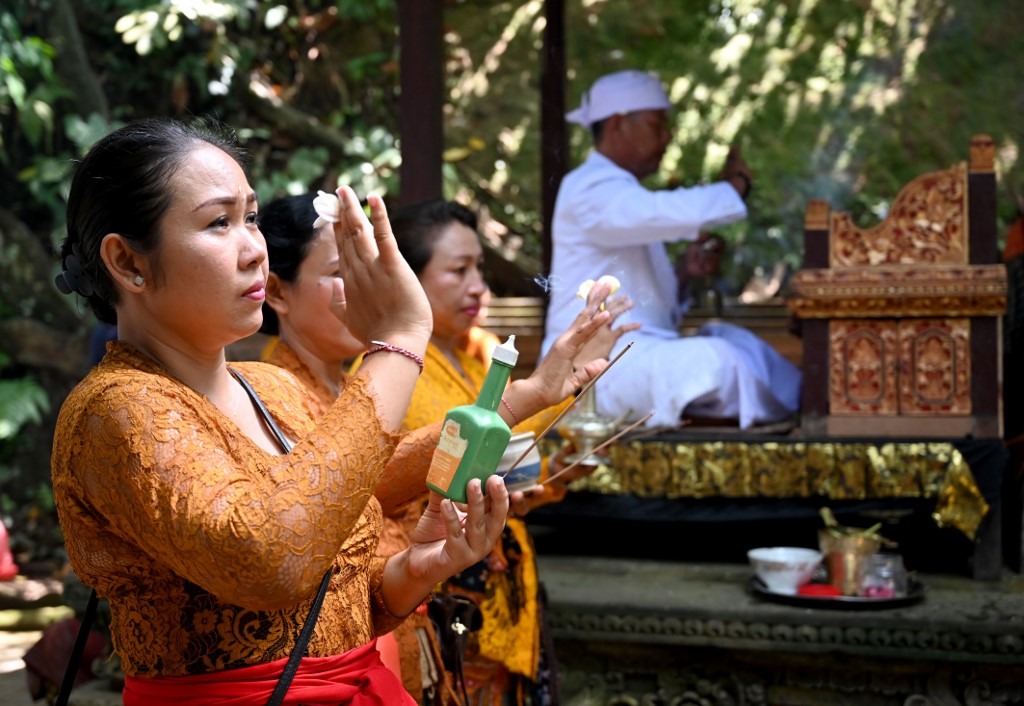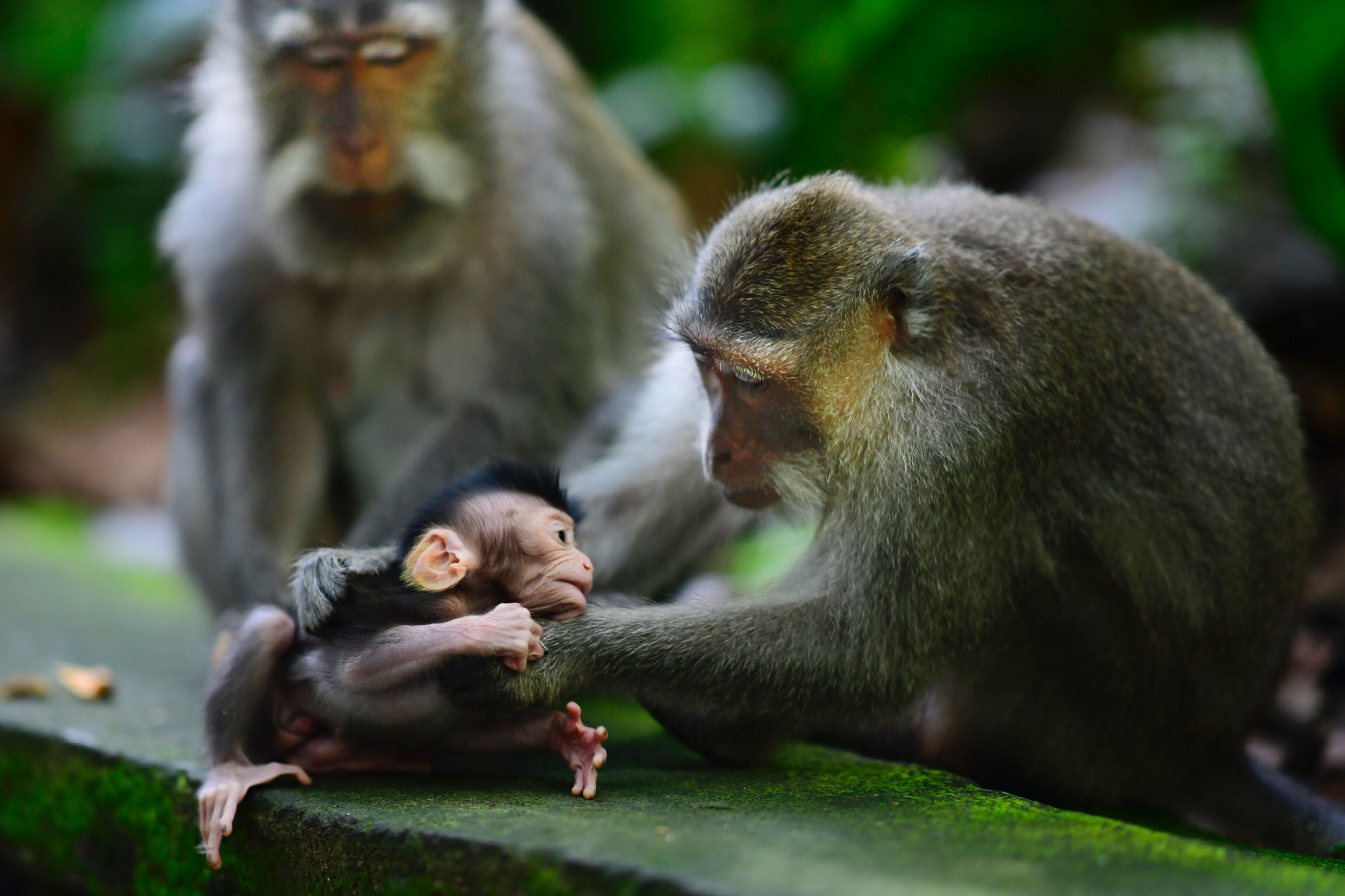Though the ongoing Covid-19 pandemic has drained Bali of its tourism economy, the primate residents of one of its formerly popular sites are still making a steady living.
The Sacred Monkey Forest Sanctuary is a small remnant of native forest, a densely wooded, 12.5 hectare park containing three temples that local Balinese near the town of Ubud have used as a sacred site for more than 700 years. It’s also home to more than 700 long-tailed macaques, among Southeast Asia’s most prolific monkey species, featuring heavily in tourist destinations across the region gobbling up whatever treats a visitor might offer.
Before the pandemic shut down international travel, thousands of tourists came daily to see the Monkey Forest, sustaining the macaques by buying bananas from middle-aged Balinese women who sat at the park entrance with full baskets. Everywhere there were humans – talking, laughing, occasionally screaming as a monkey mounted someone’s leg to grab food. Now, the only sounds are an occasional monkey hoot or bird call. The only humans are a handful of staff, sweeping paths, monitoring the monkeys and unlocking food cages at feeding time.
But unlike viral stories about monkeys in India and Thailand overrunning local villages in search of food, the Ubud macaques are staying put – if anything causing fewer problems in the adjacent village of Nyuh Kuning. The reason is that park staff, despite the loss of tourist income, sustain the monkeys at great expense as they feed them at least twice a day, resulting in a notable change to the macaques’ behaviour.
Pak Sudra owns a small warung (cafe) and house almost next to Nyuh Kuning village on the far side of the forest. He said that he’s seen fewer monkeys since the park closed, adding that prior to this turn of events, they could be a nuisance – stealing food, climbing on electricity wires, pulling the stuffing out of motorcycle seats and knocking over garbage cans.
“This was once all their territory,” he said, the sweep of his arms taking in the whole surrounding village. “So we have to be patient [about their destructive behaviour] because we built on their land.”
The Monkey Forest Sanctuary is owned by the nearby village of Padangtegal, which has merged with the town of Ubud. The village manages the park through a foundation, Padantegal Wenara Wana, and a governing board. The park was first developed as a tourist attraction in the 1980s, when about 800 people came monthly. Numbers had reached an estimated two million-plus visitors annually by 2019.
Each visitor pays an entrance fee that goes into a fund controlled by the Padangtegal Wenara Wana Foundation. This money pays for the upkeep and conservation of the monkeys and the park, as well as the cost of funerals and Hindu ceremonies for Padangtegal residents.
However, Bali, a crown jewel for Indonesia’s tourism industry, has been hammered by Covid-19 as the archipelago nation shut its borders. So, while the park management is able to continue feeding the monkeys despite the loss of income in this pandemic year – providing around a tonne of food weekly, mostly sweet potatoes and corn, according to staff – how long this can continue is unknown, with funds beyond this coming year hard to account for.
Considered sacred animals among the Balinese, locals remain vigilant they are taken care of. A woman from the village rode up on her motorbike and heaved a box of old, spotted bananas onto the ground towards the reporter and Pak Sudra.
“They’re left over from [Balinese religious] offerings,” she said. “We worry that the monkeys aren’t getting enough to eat.”
Every family in the village of Nyuh Kuning owns land somewhere outside the village where they grow flowers for offerings and fruits for eating, meaning they still have an abundance even though times are hard economically. The park management is also helping to support Balinese farmers, who normally would be growing food for restaurants and hotels, by purchasing their produce. Without markets, they have often been letting crops go to waste.

Humans aren’t part of their normal ecosystem. The macaques in the Monkey Forest are still wild animals
However, even with less food than the macaques were getting pre-pandemic, the new feeding system may have, perhaps counterintuitively, tamped down the monkeys instinctive aggressive behaviour.
With the Monkey Forest macaques now dependent entirely on regular daily feedings from staff who have little fear of them and ensure that food is shared evenly, more equal food rations mean the monkeys are less aggressive to one another. Staff confirmed that aggressive behaviour had significantly lessened without tourists, as dominant monkeys no longer need to outcompete weaker monkeys for bananas.
Dr I Bayu Wirayudha is a veterinarian who runs the Bali Wildlife Rescue Center in Tabanan, a facility based in a large central regency of the island and which rehabilitates and releases native endangered wildlife back into natural habitats. He said that each macaque group has their own territory within the forest, and with less food monkeys spend more time moving around their territory and on social activities, such as grooming, and have less contact with other troupes.
Wirayudha added that it’s also likely the Monkey Forest macaques are less aggressive now that humans aren’t coming into their habitat, using flashes when they take photos, laughing, talking, screaming or running around. He said that huge numbers of people stress the monkeys, meaning, ironically, that the monkeys may be happier without the same tourists that have ensured they are fed.
“[Humans] aren’t part of their normal ecosystem. The macaques in the Monkey Forest are still wild animals,” he said.
Pre-pandemic, groups of monkeys wandered down to a local river, across the roofs of nearby houses, jumping from tree to roof to tree. The river is their safe zone, where humans can’t follow and where they can find fruiting trees in season.
But since the park closed, only a few solitary monkeys have been seen moving along the trail to the river – a sign that their home in the forest has become a sanctuary again. Wirayudha said that given that no one is disturbing them, that they are fed regularly, and Bali’s current rainy season is unusually heavy, the park monkeys may be staying put within their territory.

Before the pandemic, monkeys would often hang out in trees and pee down on motorcyclists or harass walkers. These actions may be less a stress response, argued Clegg, than bored monkeys looking for amusement
Dr. Isabella Clegg is the founder of Animal Welfare Expertise and an independent zoo consultant. She said that she’s unsurprised to see such observable changes in the macaques’ behaviour so quickly.
Before the pandemic, monkeys would often hang out in trees and pee down on motorcyclists or harass walkers. These actions may be less a stress response, argued Clegg, than bored monkeys looking for amusement. Now, a rider or walker is largely ignored and the monkeys appear to be spending a lot of time roaming and grooming.
“Monkeys are super-flexible,” she said. “They will change their behaviour in response to cues in their environment, and pretty rapidly.”
Clegg continued that monkeys have learned aggressive behaviours to get food, jumping on a tourist to startle them into dropping bananas or whatever food items they may be holding. In fact, the Ubud monkeys had learned to steal items from tourists – phones, cameras or sunglasses – and trade them back for food.
When asked if the monkeys might still leave the forest to become pests outside, as has happened in other sacred monkey sites around the world, Wirayudha gave a confident response.
“If it’s raining, and the food supply is enough, then they have shelter and food,” he said. “If no-one is disturbing them, they won’t go anywhere else.”


